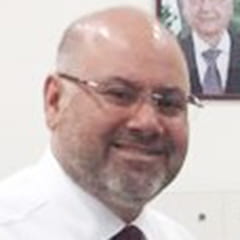
Isolation rooms at Rafic Hariri University Hospital.
Features
A public hospital rises to the challenge
By MainGate Staff
Spring/Summer 2020
Behind the Ministry of Health building along the main thoroughfare that leads south from downtown Beirut sits Rafic Hariri University Hospital (RHUH). A civil war-era institution once considered the last resort of the poor and uninsured has since become the epicenter of COVID-19 testing and treatment. In March, MainGate spoke with AUB graduate and RHUH CEO Firass Abiad (BS ’89, MD ’93, MBA ’14) about the hospital’s turnaround and the state of the pandemic and healthcare in Lebanon.
Abiad came to run RHUH after a career as a surgeon that included administrative stints at hospitals in the Arab Gulf. “I’d come back to Lebanon and joined the AUB faculty. RHUH was having lots of problems. I thought running it would be a real challenge.” Then came a job posting for CEO on the Ministry of Health (MOH) job portal.
“The hospital was in freefall, running a deficit of $15 million annually.” He explains that RHUH is expected to balance its budget while keeping patient fees and staff salaries at the levels set by the MOH. Unlike in the United States, there isn’t the same profit-drive to overprescribe tests and checkups.
The key to turning around the hospital lay in transforming the work culture. “The essence of what a manager should do is to work with people. When you go into a failing institution, you can’t hire because you have no money, and no one wants to work for you because you have no reputation. You work with what you have. We had a lot of unpolished gems who wanted the opportunity to perform but needed a bit of guidance. The same staff from 2015 is the staff we have now.”
As COVID-19 became a reality, Abiad and other healthcare-sector leaders in Lebanon met to discuss measures. “Some were very cognizant of the magnitude of the problem, others were skeptical.” Being an MOH facility, a World Health Organization (WHO) site, and having become “agile and adaptable over the years,” it was agreed the RHUH would become the main testing center. “I said we could begin taking in patients in five days.”

A nurse works in the hospital’s laboratory.

Nurses gather at the hospital’s nursing station.
WHO testing kits arrived as donations from Europe and China. “We have enough for the current situation, but there have been shipment delays due to flight lockdowns.”
RHUH is currently performing nearly half of the country’s tests, with AUBMC and other hospitals performing the rest. Abiad credits President Khuri and senior AUBMC staff with helping to advise and raise RHUH’s profile as a test center during the pandemic.
“We’re doing about 500 tests per day nationwide,” Abiad says. “It should be 2,500 per day. The main question here is: Do you have capacity in case of escalation? Can you handle it?”
